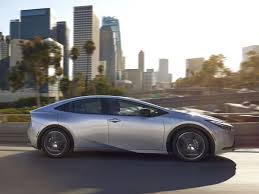
The Advantages of Hybrid Cars
Hybrid cars have gained significant popularity in recent years as more people look for environmentally friendly and fuel-efficient transportation options. A hybrid car combines a traditional internal combustion engine with an electric motor, offering several advantages over conventional vehicles.
Fuel Efficiency
One of the primary benefits of hybrid cars is their superior fuel efficiency. By using a combination of gasoline and electric power, hybrid vehicles can achieve better mileage compared to traditional petrol or diesel cars. This not only helps drivers save money on fuel costs but also reduces their carbon footprint.
Environmentally Friendly
Hybrid cars produce lower emissions than conventional vehicles, making them more environmentally friendly. The electric motor in a hybrid car produces fewer harmful pollutants, helping to reduce air pollution and combat climate change.
Regenerative Braking
Hybrid cars feature regenerative braking technology, which captures energy during braking and stores it in the vehicle’s battery. This energy can then be used to power the electric motor, reducing the need for the internal combustion engine to work as hard and further improving fuel efficiency.
Quiet Operation
Hybrid cars are known for their quiet operation, especially when running on electric power alone at low speeds. This not only provides a more pleasant driving experience for passengers but also helps reduce noise pollution in urban areas.
Government Incentives
Many governments around the world offer incentives and tax breaks for purchasing hybrid cars as part of their efforts to promote clean energy and reduce greenhouse gas emissions. These incentives can make owning a hybrid car even more cost-effective for consumers.
In conclusion, hybrid cars offer numerous advantages that make them an attractive choice for environmentally conscious drivers looking to save money on fuel costs. With ongoing advancements in technology and increasing support for sustainable transportation options, hybrid vehicles are likely to play a key role in the future of automotive industry.
Understanding Hybrid Cars: Fuel Usage, Definition, Drawbacks, and Unique Features
- Does hybrid car use petrol?
- What hybrid car means?
- What are the disadvantages of a hybrid car?
- What is so special about a hybrid car?
Does hybrid car use petrol?
Yes, hybrid cars do use petrol. Hybrid vehicles are equipped with both an internal combustion engine that runs on petrol and an electric motor powered by a battery. The petrol engine is used to generate power and recharge the battery when needed, while the electric motor assists in propelling the vehicle and improving fuel efficiency. This dual power source system allows hybrid cars to switch between petrol and electric power based on driving conditions, resulting in better fuel economy and reduced emissions compared to traditional petrol-only vehicles.
What hybrid car means?
A hybrid car refers to a vehicle that combines two or more distinct power sources to propel the vehicle. Typically, a hybrid car features a traditional internal combustion engine, usually petrol or diesel-powered, alongside an electric motor and a battery pack. The electric motor assists the engine during acceleration and low-speed driving, reducing fuel consumption and emissions. The battery pack is recharged through regenerative braking or by the engine itself. This innovative technology allows hybrid cars to achieve better fuel efficiency and lower emissions compared to conventional petrol or diesel vehicles, making them a popular choice for environmentally conscious drivers seeking to reduce their carbon footprint while enjoying the benefits of improved mileage.
What are the disadvantages of a hybrid car?
When considering the disadvantages of a hybrid car, it is important to note that while these vehicles offer many benefits, they also come with some drawbacks. One common disadvantage of hybrid cars is their initial cost, which can be higher than that of traditional petrol or diesel vehicles. Additionally, the complex technology used in hybrid cars may lead to higher maintenance and repair costs compared to conventional cars. Some drivers also express concerns about the limited all-electric range of certain hybrid models, which may not be sufficient for long journeys. Finally, the disposal and recycling of the batteries used in hybrid cars raise environmental considerations due to their chemical components. Despite these drawbacks, advancements in hybrid technology continue to address these issues and improve the overall performance and sustainability of hybrid vehicles.
What is so special about a hybrid car?
Hybrid cars are unique and special due to their innovative technology that combines a traditional internal combustion engine with an electric motor. This dual power system allows hybrid vehicles to achieve superior fuel efficiency compared to conventional petrol or diesel cars. By seamlessly switching between the two power sources, hybrid cars can reduce emissions, lower fuel costs, and contribute to a cleaner environment. Additionally, features such as regenerative braking and quiet operation further enhance the driving experience, making hybrid cars a popular choice for eco-conscious consumers seeking sustainable transportation options with advanced technology.
